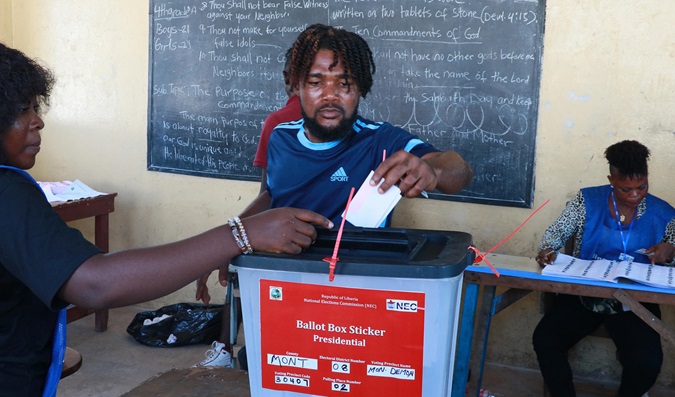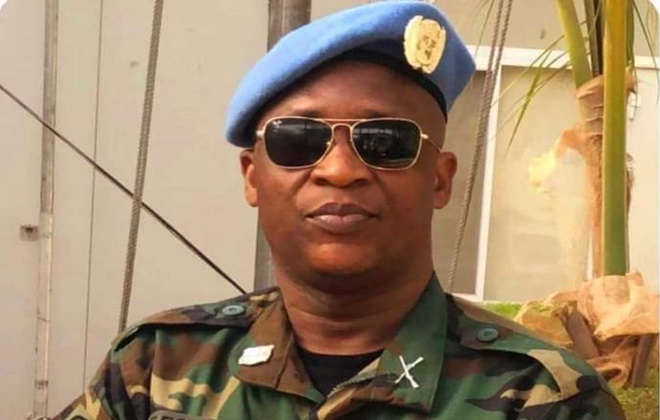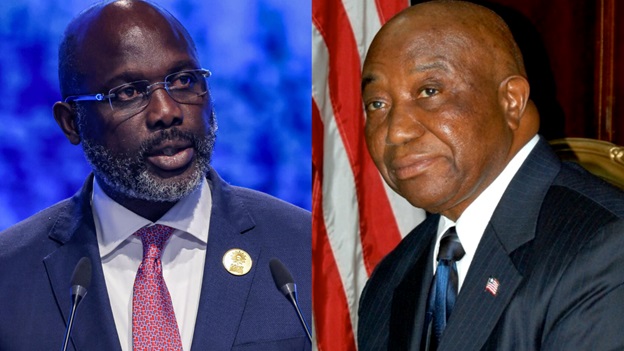Liberians’ peaceful transfer of power defies violence in the region. Can we amplify its example?
Liberia’s presidential inauguration last week, a peaceful transfer of power between opposed political parties, strengthens its postwar democracy — an achievement that we should highlight as an instructive counterpoint to West Africa’s military coups and other erosions of democracy. While 5 million Liberians confront crises including poverty, corruption and poor infrastructure, their progress in stabilizing from decades of war offers lessons for us all. Liberians’ vital strengths in this peaceful transfer include strong political will, reflected in record voter turnout, and a potent civic history of nonviolent movements for change, buttressed by U.S. support in countering corruption.
Postwar Liberia: A Hope for Africa
Liberia displayed resilience in its democratic institutions with last fall’s elections — its first without direct international election assistance or peacekeeping forces since civil war ended in 2003. Sporadic pre-election clashes and inflammatory campaign messaging prompted U.N. officials and Liberian civic activists to warn of major violence. But an October election for the legislature and presidency, and a November presidential runoff, were well-managed and drew record turnouts — as high as 78%. A razor-thin margin in the presidential tally raised a risk for a contested outcome when opposition candidate Joseph Boakai edged out President George Weah by 1.3% of the vote. But Weah quickly, gracefully conceded, declaring that “Liberia has won.”
A small country’s peaceful transfer of power generates few global headlines. Yet Liberia’s advance offers hope for the vital U.S. and international interests in building global peace and stability. Democracy advocates worldwide can take specific lessons from this advance by a nation that has faced extraordinary hurdles to democratization. Indeed, this is Liberia’s second such transfer in as many presidential elections, a sign that — against the odds — one of the world’s least developed countries, still scarred by war, atrocities and dictatorship, is cultivating a culture of democracy. That striking achievement comes, even more remarkably, against West Africa’s tide of coups d’etat and violent extremist insurgencies.
At greater scale, Liberia’s progress underscores the possibilities for democracy and postwar stabilizations in Africa, where the world’s fastest-growing population will heavily sway our world either toward greater stability and prosperity in this century, or toward unprecedented human displacement and mass migration. As the United States’ 17-month-old strategy toward Africa aims to build an unprecedented partnership with Africans to boost prosperity and democracy, we should envision how Liberia’s promising example might offer potent “peer influence” to its African neighbors. Liberia’s example could not be more timely, for 19 African countries will hold general or presidential elections this year.
Liberians Confront Postwar Challenges
Liberians’ poverty is so extreme that 83% live on less than $1.25 per day and 16% of families lack regular enough access to food to avoid malnutrition in their children. The United Nations’ global index of human development ranks Liberia 178th among 191 countries. While political and religious activity are fairly free, according to democracy analysts such as Freedom House, independent monitors and Liberians themselves emphasize that deep corruption and the impunity of the wealthy and powerful are dangerous weaknesses in governance. Accountability analysts say the state’s formal anti-corruption mechanisms are ineffective; the research group Afrobarometer recently found 72% of Liberians stating they feared retaliation for reporting cases of corruption.
This means Liberia still faces risks worryingly similar to those in nearby countries that have suffered coups d’etat. The poor rule of law and impunity for crimes by elites, reaching back to wartime atrocities 20-plus years ago, has undermined public trust in government. As candidates, both Weah and his predecessor, President Ellen Johnson-Sirleaf, promised to establish a war crimes court, a step that the country’s postwar Truth and Reconciliation Commission urged 15 years ago. President Boakai vowed last week to create an office to “explore the feasibility” of establishing such a court.
Liberia’s peaceful election and transfer of power indicate elements that the United States and international community can encourage other countries to model during the upcoming elections in Africa and elsewhere. First, Liberians demonstrated their commitment to the franchise of democracy by voting in droves and rejecting violence. Through civil society, citizens pushed energetically for peace. As in the previous presidential election, civic groups pressed the political parties to sign a pledge, the Farmington River Declaration, to ensure fully peaceful campaigning. Youth leaders convened scores of university students, political party youth leaders and social media outlets to jointly commit to peaceful, responsible online discourse around the elections. Local groups hosted community dialogues and radio programs for peace. They fact-checked political messaging to counter hate speech. The Liberian civic institutions that energized this broad campaign could serve as inspiration for their peers in countries facing similar challenges.
Second, Liberian society has come to embrace a deep aversion to political violence, rooted in decades of conflict and trauma — civil wars, assassinations and factional battles — that began in the 1960s. Liberians express a desire for stability and continued transition toward a more stable democracy. Even youth born after the wars, many of whom voted in 2023 for the first time, are reminded by older generations of the importance of consolidating the peace. “We’ve been living peacefully for 20 years now and we don’t want that to end,” said youth activist Lawrence Sergbou.
Liberians have directed those experiences into strong non-violent movements, such as Women of Liberia Mass Action for Peace, which forced former president and warlord Charles Taylor to halt fighting and leave the country in 2003. That campaign, led by civic activist Leymah Gbowee, helped end the war and led to her sharing in a Nobel Peace Prize.
Third, international engagement helped reinforce expectations of a peaceful transition. The United States sent clear signals to the Weah administration before the election — notably sanctioning three senior Liberian officials, including President Weah’s chief of staff, for corruption that “undermined democracy in Liberia.” The State Department warned that it would deny U.S. visas to anyone acting to “improperly influence” the vote, notably through violence. In December, the United States sanctioned powerful political allies of Weah, including his finance minister and a leader of his party, for human rights abuses and corruption. Collectively, these actions reinforced norms around the election — and they outlined U.S. expectations for the incoming Boakai administration.
Liberia as a ‘Peer Influencer’
Weah lived up to Liberians’ expectations by gracefully conceding defeat and stepping down. While this should be a matter of routine good governance, extra-constitutional power grabs, from coups d’état to “constitutional coups,” have proliferated alarmingly across Africa. As U.S. and European governments and institutions work to promote democracy and peace in Africa, they must place African partners at the fore, recognizing the uncomfortable reality that Western nations bear reputational burdens in Africa and elsewhere. These stem both from history — Western colonialism and support for authoritarian African allies — and from the current challenges facing democracies in the Global North.
The peer influence of other African states will resonate more powerfully across the continent, and Western states might better promote democracy by reinforcing the advances of nations like Liberia. In West Africa, Liberia’s example can help bolster the prodemocracy alignment of the regional bloc, the Economic Community of West African States (ECOWAS). Liberia’s prodemocracy example within ECOWAS became only more vital this week as three military governments in the region — of Burkina Faso, Mali and Niger — declared their intent to withdraw from the organization.
The international community tends to focus far less attention and resources on amplifying positive examples and on encouraging off ramps for leaders than on punishing anti-democratic behavior. While economic or visa sanctions around the Liberian elections proved useful, policymakers should consider how to pair them with creative ways to encourage leaders to step down in accord with constitutions, laws and elections. Such efforts could leverage U.S. soft power and public diplomacy in coordination with African partners. At the same time, policies should avoid sanctifying leaders simply for respecting democratic principles and their countries’ laws — especially if their terms have been marked by credible accounts of corruption or human rights abuses.
Prodemocracy advocates should emphasize Liberia’s relative democratic successes especially because of the country’s small size and limited state resources. Larger African nations with arguably stronger electoral institutions and better funded observation missions — as last year in the Democratic Republic of Congo and Nigeria — have suffered election violence and irregularities that raised concerns the integrity of their results.
In a West Africa roiled by the recent years’ coups, insurgencies and other crises, the military-backed transitional governments in Mali and Burkina Faso postponed elections planned for 2024. Senegal, Ghana and Liberia’s neighbor, Guinea, all will hold presidential or parliamentary elections this year. There, democracy advocates will do well to inspire citizens, civil society, political parties and candidates to look to Liberia as a model for securing a durable peace through democracy. Source: usip.org







